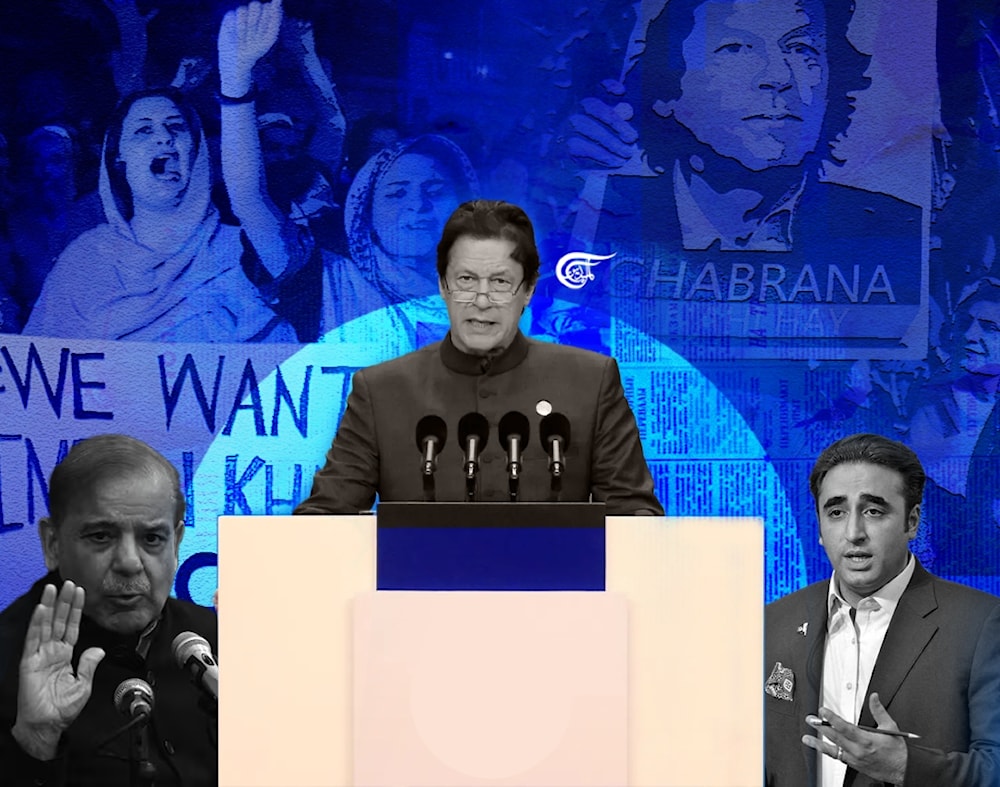Pakistan's struggle for transparency, trust
The remarkable turnout in Pakistan was a resounding protest against the attempted political oppression and the archaic status quo, reflecting the evident anti-establishment sentiment within the country.
-

The remarkable turnout was a resounding protest against the attempted political oppression (Illustrated by Arwa Makki; Al Mayadeen English)
In the annals of Pakistan’s political saga, this election emerged as a defining event. Despite all the challenges, the electorate managed to defy all odds and turned out in unprecedented numbers, tearing through the barriers of fear in pursuit of change through the ballot. Yet, their resounding and decisive voices are being drowned out once again. This remarkable turnout was a resounding protest against the attempted political oppression and the archaic status quo, reflecting the evident anti-establishment sentiment within the country.
The question should not be whether this election was truly free or fair. The persistent perception of unfairness has marred Pakistan's electoral landscape for years, and the 12th general election on February 8 only added to the existing skepticism. Questions should be raised about the integrity of the institutions of Pakistan. After Prime Minister Khan's third conviction in less than a week, resulting in an unbelievable sentence exceeding 30 years in prison, the murky machinations of the security establishment were exposed, casting a dark cloud over the legitimacy of the electoral process. This latest conviction has brought disgrace upon the nation and laid bare the mockery of justice.
The impartiality of the ECP as the guardian angel of free elections is now under intense scrutiny. The biased actions against a specific party directly undermine the assurances of the caretaker administration and the Election Commission of Pakistan regarding a level playing field and fair polls. What was meant to be a clear path of victory for the PML-N turned into a wave of popular dissent against the state.
While allegations of rigging and election day anomalies are not novel in Pakistan, the manipulation of election results undermines the country's power structures and has effectively led to growing public distrust in the system. The loss of faith in the state by the nation emerges as the most formidable challenge stemming from this election.
There are always genuine security concerns that loom large in the country, particularly as the general elections approach. This year, it was radical militants and Baloch insurgents intensifying their attacks in an attempt to disrupt and discredit the democratic process. Between February 1 and 9, there were 36 out of 63 reported terrorist attacks directly linked to election violence.
Law enforcement agencies were aware of the heightened threat of attacks and could have devised more strategic security plans. However, their choice of a blanket shutdown of mobile services across the country on this pivotal day seemed excessive and potentially harmful to the democratic process. Despite these drastic measures, the terrorists managed to carry out 11 attacks in high-risk areas.
Pakistan has heavily invested in developing counterterrorism infrastructure, such as specialized departments like the National Counter Terrorism Authority with dedicated security cells and forces. If these institutions couldn't formulate a comprehensive security plan for the elections, it's imperative for the state and the incoming parliament to critically evaluate their performance and resource allocation.
What Pakistan required was the most transparent elections in its history to restore public faith in the system. Unfortunately, the deep state in Pakistan often prioritizes "imposing order", sometimes to the detriment of political and social stability. While they may believe that order brings discipline and stability, they consistently overlook how their policies erode their legitimacy in imposing such order.
The prevalent abnormalities in the polls have garnered a strong international response. The US, the UK, and the EU have all expressed concerns about Pakistan's electoral process and have called for investigations into the reported irregularities. However, perhaps the most embarrassing critique came from the UN Secretary-General, who urged Pakistani authorities and political leaders to address election-related issues "through established legal frameworks.”
These international statements underscore a deteriorating global perception of Pakistan's democratic process and raise questions about the alleged involvement of the security establishment in manipulating the electoral process, evident in its inescapable influence.
In a remarkable move, the army chief also called on Pakistan's political parties to forge a "unified government" to steer the country away from the politics of "anarchy and polarization." Such political intrusions by the military leadership are not rare even though this does not come within their mandate. However, given the entrenched involvement of the security establishment in the political landscape, it's not entirely surprising. It also sheds light on the evolving civil-military dynamics in Pakistan.
The military elite has often struggled with legitimacy crises, often seeking refuge behind a civilian facade. However, history has proved that despite numerous attempts at political engineering, the people have consistently asserted their own will. The establishment often forgets that such persistent meddling in political affairs inevitably yields undesirable consequences.
Is this orchestrated chaos a misguided attempt at crisis management, as the establishment loses its grip over the international narrative? Daily revelations from various quarters, including disillusioned civil servants, hint at internal friction, if not outright breakdown.
There is mass hysteria within the country, and while the media bear some responsibility for it, they are not solely culpable. Decades of political engineering have created a system teetering under the weight of distortions and mutations, now imploding before our eyes.
The only path to halting the perpetual crises in Pakistani politics is for influential factions to cease their manipulation of political parties and allow genuinely elected representatives to shape the nation's future.
Artificially constructed entities have fleeting relevance and ultimately get rejected by the voters. True political forces emerge when they distance themselves from their creators and seek legitimacy solely from the people.
Even behind bars, Khan's adept use of populist rhetoric has disrupted the established playbook. Those who believed they held perpetual control over power mechanisms now face the unintended consequences of their actions.
The unfolding chaos, underscored by the events of February 8, hints at potentially graver consequences. The future remains uncertain, but one thing is evident: to rein in chaos and anarchy, new rules of engagement must be established. This pertains not only to relations between the security establishment and political leadership but also within the political sphere itself.

 Ghanwa Mohiyuddin
Ghanwa Mohiyuddin
 6 Min Read
6 Min Read









